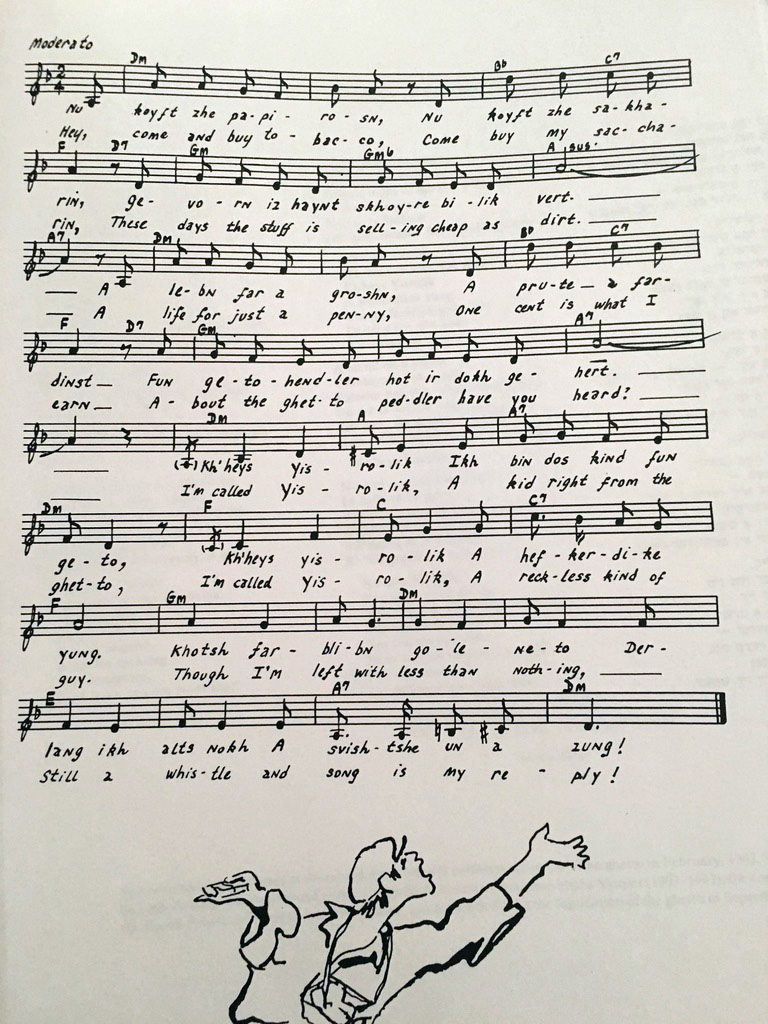what would he have become had he survived the Holocaust?
By Bonny Feldman
The doyenne of Yiddish theatre, Chayela Rosenthal, grew up in a world of Yiddish words and music.
Her older brother, Leyb (known as Leyb Rozental, the difference the surname being because of the use of an assumed English spelling of a Yiddish name), was a gifted writer, who would probably have become a huge star in the field of literature and theatre, had his life not ended at just 29.
Success came early, with the publication of a book of poetry at the age of just 14. And, while still a schoolboy, Leyb helped out at his father’s Vilna-based daily Yiddish newspaper, Der Ovent Kuryer/The Evening Courier, becoming involved in many activities relating to the publishing trade, including writing new chapters for American serial romance novels that the newspaper published.
While still in his teens, Leyb was commissioned by a local theatre to write songs and comedy sketches. Despite his youth, they were successful among an adult audience. He also wrote material for the performance of puppet theatre.
When just 18, Leyb began publishing a newspaper in the town of Lida, called the Lider Folksblat (Lida People’s Newspaper). At this time he became a socialist, highlighting the rights of the proletariat and showing an affinity with the Jewish working class. At times, his political views got him into trouble with the authorities but he continued with his work. This led him to focus increasingly on writing for the stage. Believing in the power of music as a means of communication, he wrote songs that many people would sing, thus repeating his messages about society and life.
For Leyb and his socialist friends, the arrival of the Soviets in Lithuania in 1939 was a moment of victory, and he began composing songs in praise of the Soviet Union. These proved popular, and Leyb became a well-known name when his songs were played on the Vilna radio.
These happy days soon ended, however, with the 1941 invasion by the Germans. Leyb and Chayela’s father was murdered soon after the arrival of the Germans, and Leyb had to take some daring steps to avoid capture.
Leyb, Chayela, their sister Mary and their mother were forced to leave their home and move to the Vilna Jewish Ghetto. In due course, Leyb became involved in the mission to save valuable Jewish manuscripts — an initiative known as ‘The Paper Brigade’.
The opening of a ghetto theatre provided Leyb with the opportunity to produce far more material, and he wrote songs that have become entrenched in the legacy of Yiddish literature from this period. The most well-known of these is Mir Lebn Eybek (We Live Forever), and it typified the messaging that Leyb aimed to convey: to provide hope to those trying to survive the awful conditions in the ghetto.
In September 1943, with the liquidation of the ghetto, Leyb was sent to a forced labour camp in Estonia. There, he continued writing new songs, all geared to memoralise the Jews of Vilna and the horrors they faced under Nazi occupation. By this time, the vast majority of Lithuania’s Jews had been killed, and a year later, knowing that they were facing defeat, the Germans undertook the murder of the remaining Jews, including Leyb, who died just a few days before the arrival of Russian troops, who liberated Lithuania from the Nazi yoke.
Leyb Rozental’s contribution to the Yiddish language and to the recording of the horrific actions perpetrated against the Jews of Lithuania was huge. As recorded on the website, put together recently by his niece, Zola Piatka Shuman, “…Leyb left for posterity an important document about their thoughts and state of life, a picture of men, women and children, of workers, lovers and the elderly, all in songs and narrative, in comedy and drama — a ghetto kaleidoscope of events.”
Had Leyb survived the War, he would probably have found international fame as a writer and musician. His story highlights an important element of genocide: that the actions of perpetrators of hate remove so much talent and skill from the world.
NOTE: Cape Town resident, Zola Piatka Shuman, did not know much about her Uncle Leyb at all. It was only during the Covid lockdown, when she began going through boxes of material that had belonged to other, now deceased, family members that she discovered the story and the brilliance of the uncle she never knew. Thanks to undertaking this huge task, Zola has recreated the life of a gifted man, and her work brings renewed appreciation of the music of her Uncle Leyb.

• Published in the July 2023 issue – Click here to start reading.
• To advertise in the Cape Jewish Chronicle and on this website – kindly contact Lynette Roodt on 021 464 6736 or email advertising@ctjc.co.za. For more information and advertising rate card click here.
• Sign up for our newsletter and never miss another issue.
• Please support the Cape Jewish Chronicle with a voluntary Subscription for 2023. For payment info click here.
• Visit our Portal to the Jewish Community to see a list of all the Jewish organisations in Cape Town with links to their websites.
Follow the Cape Jewish Chronicle: Facebook | Instagram | Twitter | LinkedIn










